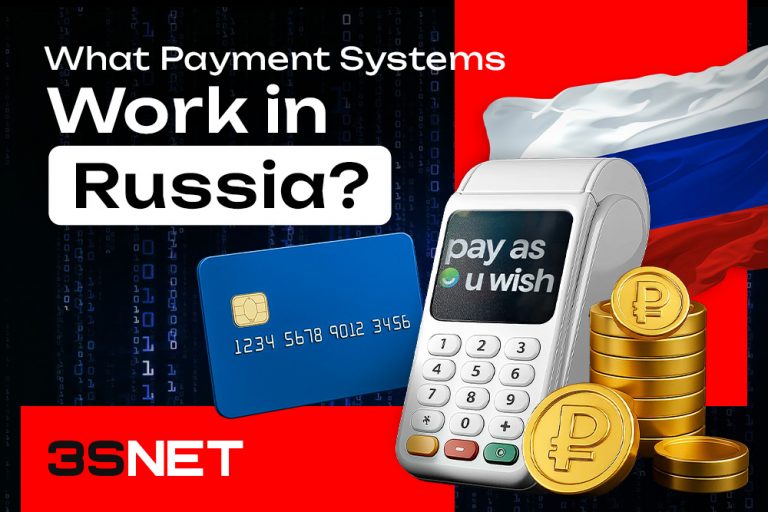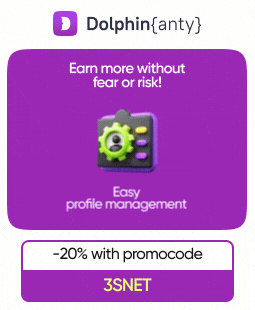
Last Updated: 10 october 2025
Understanding the available payment systems in a country is critically important for both users and gambling website operators, as it affects the convenience and safety of depositing funds, speed of withdrawal, and overall accessibility to the gaming process. If a payment system is unsupported or blocked in the country, players won’t be able to fund their accounts or withdraw winnings, and the site itself risks losing customers. On 3S.INFO, we detail which payment systems and services function in Russia: which are fully accessible, which are limited or blocked, and what alternative payment options exist.
Making Payments in Russia: Available Systems & Services
The legality and regulation of a payment system allow the platform to comply with the law, combat fraud, and protect players’ financial data. Payment methods (bank cards, electronic wallets, mobile payments, and cryptocurrency) differ in processing times, fees, and limits, affecting user comfort and the speed of financial transactions.
In Russia, the following main payment systems and services operate in 2025:
- National payment system “Mir” is the primary tool for payments and transfers, supported by over 170 banks and used for social benefits, subsidies, transportation, and utility services. Contactless payments are possible through the Mir Pay app.
- Faster Payments System (SBP) — enables transferring money via phone number and paying for purchases, widely integrated into banks, supports QR codes and NFC for instant payments. Used by every third resident of the country.
- UnionPay is an international system partially functioning in Russia, primarily utilized for cross-border payments.
- Robokassa, CloudPayments, PayMaster, Platega are Russian services for accepting online payments via cards, wallets, SBP, offering automation, auto-billing, and analytics capabilities, easily integratable with websites and apps.
- Traditional banking acquirers (Sberbank, T-Bank, VTB, etc.) support “Mir” cards and payments via Faster Payments System.
- Qiwi and WebMoney — functional for certain scenarios, but losing popularity due to new domestic alternatives and identification requirements.
- Alternative methods include cryptocurrency gateways and digital wallets, which are gaining popularity for online operations.
- International systems Visa and Mastercard are unavailable domestically and are used only abroad.
In 2025, Russia focuses on domestic solutions, Faster Payments System, “Mir,” UnionPay, and modern integrations with businesses. The Russian market continues to expand the choice of tools for legal and quick payments.
- Why is it important to know which payment systems work in different countries? Even the most attractive offer (with a current bonus and precise GEO targeting) may show low deposit conversion rates. Often, the problem lies not in the quality of traffic, but in payment solutions. In the iGaming industry, local payment methods (LPM) play a critical role. Choosing the wrong method leads directly to lost payments and reduced profitability. On 3S.INFO, you’ll find an up-to-date overview of LPM for 2025: a list of effective tools, regional specifics, current trends, and essential limitations that must be taken into account to maximize payouts.
Which Foreign Payment Systems Accept Russian Bank Cards
Abroad, Russian bank cards mainly work in the payment systems “Mir” and UnionPay, whereas international cards Visa and Mastercard issued by Russian banks stopped working outside Russia starting from 2022.
Payment Systems That Accept Russian Bank Cards Abroad
Cards issued by Russian banks with the “Mir” and UnionPay payment systems can be used abroad, although they are subject to limited acceptance and availability. International Visa and Mastercard cards issued by Russian banks are not accepted internationally. Therefore, for international trips, it is advisable to obtain cards of these systems through foreign banks or intermediary services.
How Does WebMoney Work in Russia in 2025?
In 2025, WebMoney continues to operate in Russia but with certain restrictions. Ruble wallets (WMR, WMP) are unavailable because the servicing bank’s license was revoked back in 2022. However, Russians have access to other wallets like dollar (WMZ), euro (WME), tenge, crypto, and others.
Main Features of WebMoney in Russia
- Making online purchases, including some marketplaces and tickets.
- Transfers between WebMoney wallets, to bank cards via P2P services, exchange to cryptocurrencies.
- Receiving and sending payments to foreign wallets and banks, though functionality may be limited due to sanctions.
- Payment of services, loan arrangements between users, issuance of virtual cards.
- To work with foreign services, workarounds are used — cards like “PeopleBot,” foreign gift cards, or third-party exchangers, although exchange rates are often unfavorable.
To fully utilize the system, users must undergo identification and obtain a formal certificate, which is necessary for transferring funds to cards and accessing certain services.
Restrictions on WebMoney Operations in Russia
- There is no opportunity to create and use ruble wallets. All operations are available in other currencies.
- Sanctions complicate interaction with foreign WebMoney services, but the service itself is not blocked and continues to function for Russian users.
WebMoney remains one of the few international payment systems accessible to Russian users, but its core functionality is limited to non-ruble wallets.
How Does Qiwi Operate in Russia in 2025?
In 2025, Qiwi resumed operation in Russia despite QIWI Bank losing its banking license and being liquidated in 2024. Qiwi adapted to new legislative requirements: the service now operates on a multibanking model and provides financial services through partnership structures.
Key Features of Qiwi in 2025
- The Qiwi Wallet is once again available to Russian users. It can be used for purchasing goods and services, transferring funds between wallets, and integrating with banking applications.
- Wallet funding in rubles through Russian banks, as well as withdrawing funds to bank cards, are available.
- The service introduces new features, including integration with banking apps (such as Sberbank Online, T-Bank) and compliance with legal norms regarding cryptocurrency operations.
- Qiwi develops processing directions, aggregator services, and plans to launch new fintech services for partners and B2B clients.
Limitations and Specifics of Qiwi in Russia
- QIWI Bank no longer performs banking operations; all services are provided through partnership structures.
- Given the context of sanctions and regulations, the service adapts its products and implements new security measures for customers.
- Qiwi also implements a loyalty program and a bonuses system for users.
Despite changes in its business model and loss of banking license, Qiwi maintains its popularity thanks to convenience, integration with major banks, and new possibilities for payments and transfers.
How to Make Payments Using Google Play and Apple Pay in Russia?
Google Play and Apple Pay operate with certain restrictions: payments made through Google Play can be processed using international virtual cards, intermediary services, and gift cards, while direct payments with Russian cards are not accepted.
Google Play: Payment Options in Russia
- Russian cards (Visa, Mastercard, Mir) are not directly accepted by Google Play.
- Working methods: international (virtual) bank cards, intermediary services (Oplatym and others), Google Play gift codes.
- Users frequently change their account region to a country where restrictions do not apply for payment purposes.
Apple/Apple Pay: Payment Options in Russia
- Apple Pay has become completely unavailable for Russian cards since the sanctions of 2022 and ceased to function even for cards of foreign banks in Russia as of September 2025.
- For purchases in the App Store, users employ foreign Apple gift cards, accounts of foreign banks, and intermediary services, or make payments through third-party bank applications, such as SberPay for “Mir” cards.
- Some banks offer offline store payments via NFC, but these transactions work only outside of Apple Wallet and exclusively with “Mir” cards in separate banking apps.
Direct payment for Google Play and Apple Pay services with Russian bank cards is impossible, but alternative options are available through virtual cards, gift cards, and intermediary services.
Which Payment Systems Are Blocked in Russia?
In Russia, as of 2025, the following payment systems have been blocked or suspended:
- International systems Visa and Mastercard effectively withdrew from Russia in spring 2022 due to sanctions. New card issuances and extensions are not produced. Cards work only within the country and are not accepted outside of Russia.
- Contactless mobile payments Apple Pay and Google Pay ceased support in Russia in 2022. Huawei Pay and Samsung Pay also became unavailable in 2024. Payments with Russian cards through these services are impossible.
- PayPal officially does not support Russian customers since 2022. The majority of services are unavailable, and financial transactions are blocked.
- Stripe has limited operations for Russian users. New connections are impossible, requiring business registration abroad for usage.
- International money transfers via SWIFT work with restrictions. Many European and U.S. banks and payment gateways block transactions with Russia.
- Several other foreign payment services, including Coinbase (cryptocurrency service), Trezor (hardware crypto wallet), Tether, and other crypto services, have either halted or severely restricted operations for Russian users.
- Western Union and Zolotaya Korona face restrictions for transfers into and out of Russia.
Thus, in Russia, international payment systems such as Visa, Mastercard (abroad), contactless mobile payments like Apple Pay and Google Pay, as well as most major international payment services and money transfer systems, are blocked or unavailable. Instead, the national payment system “Mir” and domestic equivalents are actively used.
What Alternatives to PayPal and Stripe Are Currently Working for Russians?
For Russians in 2025, the following working alternatives to payment systems PayPal and Stripe are available:
Alternatives to PayPal in Russia
- Payoneer is a popular alternative to PayPal for international payments and freelancer payouts. Supports multi-currency accounts and multiple payment options, suitable for working with foreign clients.
- Skrill is an e-wallet enabling receiving payments, sending transfers, and making online purchases. New registrations in Russia are limited, but existing accounts operate with restrictions.
- Neteller is another e-wallet similar to Skrill and Payoneer, supporting international payments.
- Wise (formerly TransferWise) is a service for international money transfers with low fees and favorable exchange rates. Useful for receiving payments from foreign clients.
- 2Checkout, Square, Shopify Payments, Authorize.Net are payment systems with international coverage, also functioning in various countries and serving as alternatives to PayPal.
Stripe Alternatives
- Alternatives to Stripe include PayPal, Amazon Pay, Adyen, Shopify Payments, and GoCardless, which facilitate credit card payments, integrate with online stores, and handle multi-currency transactions.
- Russian payment services such as Robokassa, CloudPayments, and PayMaster support various payment methods, including cards, e-wallets, Faster Payments System (SBP) for domestic operations. Some integrations enable international payments through partner solutions.
For international payments and receiving payments abroad, Russians use services like Payoneer, Skrill, Wise, 2Checkout, Square, and Shopify Payments as alternatives to PayPal and Stripe. For working with Russian clients and accepting local payments, they use Robokassa, CloudPayments, and PayMaster.
Share it with your friends via favorite social media



























